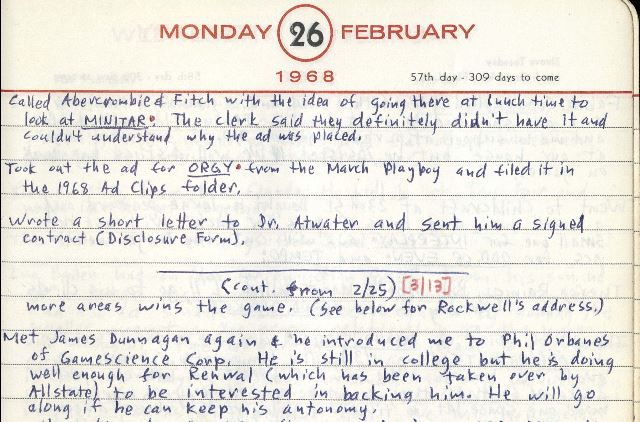In October 2021, The Strong launched The Sid Sackson Portal, a project funded by the National Archives’ National Historical Publications and Record Commission, which holds pride of place here in the archives.. On the site, you can view full PDFs of each year’s diary or Browse the Collection to keyword search or to view individual page image files. You can also learn more about Sid and his career, view hundreds of photos of game prototypes (as well as published games), and check out glossary terms about the people, games, corporations, and publications to which Sid often referred.
While everyone can view the digitized diary pages online, our current phase of the project is to ensure that each and every one of the diaries’ pages are transcribed and fully accessible to all users. People from around the world have assisted with the Transcription Project, and to this point, we have fully recorded the years 1963 through 1970. That’s more than 3,300 pages! (A considerable portion of those were painstakingly prepared by Jeff Black of Little j Games.) Some of my favorite eventful entries include:

- Sunday, February 25, 1968 [continued on Monday, February 26 page] – Sid meets Phil Orbanes for the first time. “Met James [Dunnigan] again & he introduced me to Phil Orbanes of Gamescience Corp. He is still in college but he is doing well enough for Renwal (which has been taken over by Allstate) to be interested in backing him…”
Phil Orbanes has gone on to have a lengthy career in the games industry, including as a VP at Parker Brothers and co-founder of Winning Moves Games. He also wrote the definitive history of Parker Brothers (The Game Makers: The Story of Parker Brothers from Tiddledy Winks to Trivial Pursuit) and is a world-renowned Monopoly expert.

- Sunday, May 31, 1970 – Sid and his wife Bernice are (suddenly!) in Paris. “Called Pierre Berloquin when we got to the hotel in Paris. He and his wife, Annie, picked us up at the hotel and took us for dinner.” There is absolutely no lead-up in the journal for this trip, and all of the diary entries of their European journey (a two-week trip from May 31 through June 12) are related to seeing/purchasing games in shops or department stores. I just hope that they also visited some of the sites while in Paris, London, Switzerland, and Rome—at least, for Bernice’s sake!

- Tuesday, September 1, 1970 [continuing on Sunday, August 30 page] – While demonstrating some of his games in New York City, Sid chatted with composer (and game fan!) Stephen Sondheim. “Stephen Sondheim, who says he is a game collector and inventor, stopped by. He has [A Gamut of Games] and several of my games.”
In addition to winning major awards for iconic musicals like West Side Story, Company, and Sweeney Todd, Sondheim wrote cryptic crosswords for New York magazine, collected puzzles, subscribed to GAMES magazine, was a member of American Games & Puzzles International, and an escape room enthusiast.
There are also some mysteries I’m keen to solve… For example, during the 1960s, Sid often wrote about meeting with or getting information from “X,” clearly a coded identity of an executive at an unnamed game company. (My colleague Nicole and I have been trying our hardest to sleuth out who “X” could be—maybe an entry you stumble upon could unlock the secret!) Also, Sid noted when game prototypes of his were given name changes along the way to being published; I would love if we could compile a definitive list of these alternate titles to add to the site’s glossary page.

Five diaries will be “open” for transcription at a time, and as entire diaries are transcribed, reviewed, and approved, we’ll unlock the next chronological one. (Right now, 1971 through 1975 are available for transcription.) There’s so much more to uncover, including the advent of video games, Dungeons & Dragons, and more complex electronic toys and games. If you’d like to join in, read about The Transcription Project, create a MediaWiki account, and start typing! You can help take this project across the finish line—and ensure that Sid’s documentation on the games industry is useable for decades to come.


